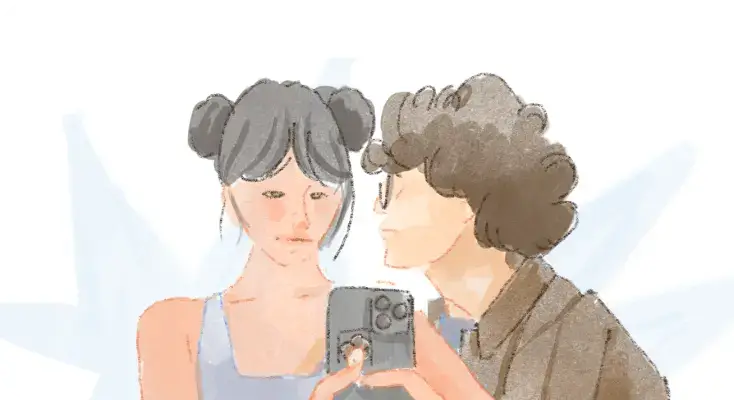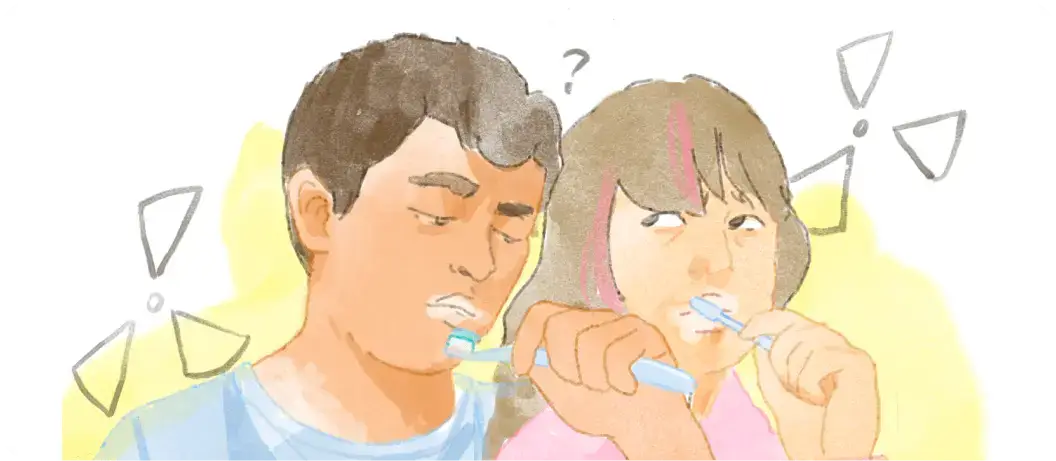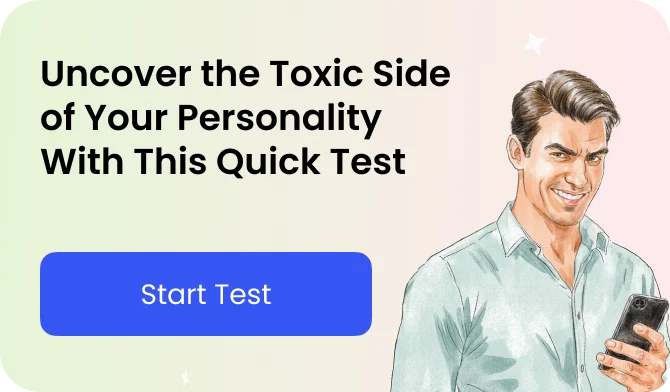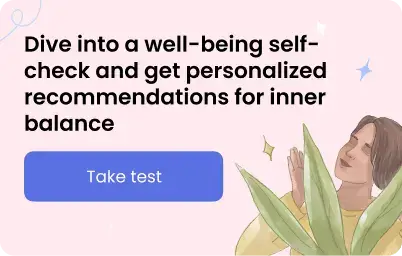In every relationship, there are ups and downs, but sometimes those downs can be more than just a rough patch. Protecting your mental health and well-being requires you to be aware of the warning signs of a toxic relationship and to do something about it.
15 signs of a toxic relationship
Here are 15 signs that help you know if your relationship is toxic:
1. Silent treatment
Have you ever experienced the deafening silence that fills a room when someone you love shuts you out? It might be silent treatment. This passive-aggressive tactic involves one person refusing to communicate with or engage with the other while being emotionally unavailable, leaving the victim feeling isolated, hurt, and confused.
For instance, a toxic person may abruptly cease communication with you for hours, days, or even weeks. Or they just up and disappear, leaving you in the dark about their whereabouts and return plans.
Even when you try to communicate directly with a toxic partner, whether in person or online, they will ignore you. If people around you seem to be oblivious to your words and feelings, it might make you feel like you are in a silent horror movie.
2. Name-calling
Calling someone names in relationships means using insulting or degrading words to make someone feel bad about themselves. It is a type of verbal abuse meant to lower the abused’s self-esteem and make them lose control of their feelings, and may be provoke reactive abuse.
There are many forms of name-calling. It can be more obvious ones, like “stupid,” “idiot,” and “worthless.”
Insults or put-downs may also be hidden in the form of jokes or sarcastic comments. Name-calling can damage communication and the well-being of the person on the receiving end.
3. Controlling behavior
Let’s say you got together with your friends for brunch every Saturday morning. This was your weekly opportunity to stay connected and have fun with your friends and family.
But your toxic partner pushes you to bring them and constantly starts arguments with you afterward about the topics you discussed. Or they may ask you to stop talking about certain things with your friends. Eventually, they ask you to stop going to brunch altogether and then ask you to limit any interaction with your friends and family members.
Controlling behavior isn’t always obvious at first, but you may start to notice it more over time. It might involve isolating you from your support system, micromanaging you, or violating your boundaries.
4. Jealousy
Many of us experience jealousy from time to time. Jealousy often comes from a perceived threat. It can become unhealthy when we respond from our jealousy instead of looking at what’s causing it and communicating our own needs.
In an unhealthy relationship, your partner may express jealousy when you’re around your friends or co-workers. They might fear you developing close relationships with them and neglecting them.
As a result, they constantly bring up the time you’re spending with others or accuse you of cheating or abandoning them. This can create resentment in a relationship.
5. Guilt-tripping
It is a manipulation tactic and another sign of a toxic relationship. In an unhealthy relationship, someone might use it to cause another to feel guilty or responsible for something they are not. This often leads the person feeling guilty to change their behavior.
For instance, let’s say you stayed late at work to finish up a project for a big deadline, which means you got home late. Your partner says that you “always come home late” and that you “must not care” about the relationship.
The next time your boss asks if you’re able to help with something that extends a little past 5 o’clock, you say “no,” even if it’s something you really want to do.
6. The blame game
We all can make mistakes, even in a healthy relationship. Nevertheless, you collaborate to resolve the issue rather than assigning blame. In other words, it involves acknowledging one’s error and expressing regret. But in a toxic relationship, blame is akin to an uninvited guest who not only disrupts your party but also leaves you feeling drained.
A toxic partner is unwilling to accept responsibility for the negative aspects of the interpersonal relationship and accuses you of every wrongdoing that transpires in their life. Understandably, this can be exceedingly distressing.
However, it is unnecessary to assign blame and point fingers; this does not resolve any relationship issues. In reality, it exacerbates the problems associated with toxic relationships. Rather than collaborating to identify resolutions, both parties experience an interminable impasse.
7. Manipulation
Toxic or manipulative people may attempt to influence your actions, decisions, or relationships with others. They may use guilt, intimidation, or threats to achieve their objectives. Even when they are clearly at fault, toxic or manipulative individuals may always portray themselves as the victim.
They will do everything to avoid their own mistakes and responsibility for them, leaving the manipulated person feeling guilty all the time. Being constantly manipulated can make you employ tactics to please your partner or take the blame for everything and feel drained.
8. Gaslighting
If they’re making you question your sanity more often than a thriller movie, you might be getting gaslighted. Gaslighting is a type of emotional abuse that can happen to anyone, especially in romantic relationships. It can be scary to be tricked into questioning your sanity.
When one partner commits an abusive act and then tries to cover it up, it can be an example of gaslighting. Even though your reaction was appropriate, you might begin to wonder if you were too emotional. Repeatedly, your toxic partner may tell you that you are either too emotional or fail to comprehend their feelings, leaving you questioning your reality with emotional harm.
9. Constant drama and conflict
It is true that there will always be small disagreements between people who are dating or in a relationship, but toxic relationships are built on constant negativity, and fighting might feel constant. Or, things can feel blown out of proportion.
For example, you might be talking about what to do over the weekend. This could quickly become an argument in a toxic relationship and lead to statements like, “You never make enough time for our relationship!”
Your relationship might be unhealthy if the conflict between you and your partner often escalates, making you question something like, “Why does my boyfriend hate me?“
10. Lack of trust
When one partner in a toxic relationship manipulates, lies to, or emotionally abuses the other, trust breaks down. Having a toxic partner can make you feel insecure and doubtful because they often lie, gaslight, or break promises.
One or both partners may find it difficult to feel safe and valued when trust is eroded by betrayal, whether it is infidelity or secrecy. Without trust, a relationship becomes a cycle of suspicion and resentment, preventing genuine emotional connection.
For example, in a controlling relationship, one partner may constantly check the other’s phone, accuse them of cheating, or isolate them from friends. This behavior stems from insecurity but ultimately damages trust.
Another example is when a partner repeatedly breaks commitments, such as promising to change but continuing toxic behavior like excessive jealousy or emotional withdrawal.
11. Constant criticism and belittling
If your partner embarrasses you in public and in private, it’s definitely a strong toxic sign. Constant criticism, no matter how subtle, can be very harmful. It could look like someone always pointing out your flaws or saying things that make you feel bad about yourself.
You might even start asking yourself, “Am I the problem in my relationship?” It leaves you feeling like you can never measure up or be good enough.
12. Overstepping boundaries
People in healthy relationships have mutual respect and are able to communicate their boundaries in a healthy way. In an unhealthy relationship, your partner might constantly disregard or violate your boundaries, leading to enmeshment trauma. Making decisions for you or without your permission is one example of overstepping your boundaries.
Overstepping boundaries can happen for a number of reasons, such as the boundaries not being clear, your partner choosing to ignore them, or they’re attempting to control your behavior.
13. No respect
Respect is another key ingredient for healthy and long-lasting relationships. It’s a way of showing others that we care for and value them. When your partner makes comments or behaves in ways that make you feel inadequate and unheard of, you might notice a lack of mutual respect.
This can seriously harm your sense of self. That’s what no respect looks like in a relationship – your thoughts, feelings, or time are treated like leftover pizza – good to have around but not valued.
14. Emotional unavailability
Have you ever tried to share your feelings with your partner and felt like you got nothing in return? When you’re dealing with someone who is emotionally unavailable, it doesn’t quite feel like things are reciprocal. Some signs of emotional unavailability are a fear of closeness, trouble expressing feelings, and a fear of commitment.
People who are not emotionally available may act inconsistently when they talk to you, randomly answering or not answering or texting you back after a long wait. All of which are signs of a toxic relationship. These toxic behaviors can definitely make you feel worse mentally or emotionally.
15. Lack of support
In a healthy relationship, support is a cornerstone. It’s the foundation that allows both partners to grow, feel secure, and navigate life’s challenges together. But this is not always present in dysfunctional relationships. Lack of emotional support can leave you feeling uncared and alone in this relationship.
What is a toxic relationship?
It’s those toxic behaviors in your close interaction with your significant other that bring you down, drain your energy, and negatively impact your overall well-being. If you are in a toxic relationship, it is like being around poison or toxic waste for a long time: it is hazardous for your mental health.
Originally coined by Lillian Glass, a psychology expert, in her 1995 book “Toxic People,” the term describes a relationship between people who don’t support each other, where there’s conflict, and one seeks to undermine the other, where there’s competition, disrespect, and a lack of trust. [1]
According to Glass, toxic relationships can arise from incompatible personalities. For example, a sarcastic person dating someone with thin skin could be an unsuitable match.
An increasingly popular adjective “toxic,” was even named 2018’s Word of the Year by the Oxford English Dictionary, especially in the context of relationships. [2]

Why do therapists avoid using the term “toxic relationships”
Some therapists steer clear of using toxic in the context of describing relationships (therapist speak). Calling someone “toxic” may seem like a judgment or evaluation of a person. Instead, some therapists prefer to refer to the behaviors as healthy or unhealthy.
Labeling someone as ‘toxic’ also can oversimplify complex human experiences and overlook the underlying causes of their actions. Leah Aguirre, LCSW, for example, said she likes using the word “unhealthy” (like someone’s behavior is bad for you or your mental health) instead of saying they are completely toxic and cannot be fixed.
In this article, we will use the common non-psychology term “toxic relationship” to refer to a relationship where you feel disrespected, your boundaries are violated, or you feel unhealthy, which negatively affects your emotional health.
The key here is to recognize the real toxic environment and red flags that can harm you and take the necessary action.
Toxic relationships vs. abusive relationships
Although abusive behaviors and toxic relationships have some things in common, it is important to know the differences between them. Toxic or unhealthy relationships can be draining and harmful to your emotional well-being, but they don’t necessarily involve the dynamic of control or harm that characterizes abusive relationships.
In a toxic relationship, someone might behave in an unhealthy way or lack respect. In an abusive relationship, someone might engage in abusive behaviors with the intention of harming someone else.
Also, in abusive relationships, there’s a power imbalance, with one person having more influence, which allows them to harm others.
Your relationship might be toxic if your needs aren’t being met or you often feel invalidated by your toxic partner. Your relationship might be abusive if your partner tries to control your relationships or finances, belittles or berates you, or becomes physically violent. Also, abusive relationships have an abuse cycle that can end as reactive abuse or trauma bonding.
So try to ask yourself, “Is my relationship unhealthy or really abusive?” If you find yourself in an abusive relationship or physical danger in toxic relationship, you have every right to seek support and help.
Remember, you are not alone, and there are resources available to assist you on your journey toward healing and safety.
- National Domestic Violence Hotline: 1-800-799-SAFE (7233)
- Love is Respect: National Dating Abuse Helpline: 1-866-331-9474
These hotlines work with trained professionals who can provide guidance, support, and resources specific to your situation.
Effects of toxic relationships on your mental health
People are social animals, and their brains are wired to foster this. Intimate relationships and interactions with other people are very important to our emotional health since positive interactions reduce the risk of these issues. [3]
Recent studies from Ireland and the USA have found that negative social interactions and relationships, especially with partners/spouses, increase the risk of depression, anxiety, and suicidal thoughts. As well as a significant decline in self-esteem and heightened stress levels that affect your overall well-being and provoke long-lasting emotional trauma. [4,5]
- Emotional Consequences: It may be a cliché, but it can be difficult to avoid the sensation of being on an emotional rollercoaster in a toxic relationship. Constant criticism, manipulation, and belittlement eat away at your confidence, leaving you questioning your worth.
- Social Effects: Toxic relationships and toxic partner also have a knack for isolating you from your support network. Friends become distant, family ties strain, and suddenly, you find yourself feeling alone in a crowded room. Cutting you off from your support system may be intentional in an unhealthy relationship as a way to isolate and keep you feeling stuck.
- Work and Productivity Effects: The effects of a toxic relationship can seep into every aspect of your life, including your career. Decreased focus, loss of motivation, and even missed opportunities can become the norm.
Leave the toxic relationship cycle with my free mini course on attachment styles in the Breeze: mental health app. Download and immerse yourself in self-discovery!
10 steps to take when you detect toxic signs in a relationship
Worried that your relationship might be toxic or unhealthy? Here are 10 tips or steps you can take to take care of yourself.
1. Trust Your Gut
The first rule of the Fight Club of life: always trust your gut. If something feels off and like bad behavior, it probably is.
2. Recognize the Signs
Know the toxic relationship signs. It can be easier to spot toxic behaviors if you’re aware of them and have a sense of what they look like in a current relationship. You can always come back and reference the list above if you’re unsure.
3. Seek Support from Loved Ones
Don’t hesitate to reach out to family and friends or a support network to discuss your situation and gain perspective. A personal and safe place where you can think about how you feel about your relationships.
4. Establish Boundaries
It’s important to set clear and healthy boundaries to protect yourself and communicate your expectations to your partner in a respectful way.
5. Speak Up
Beyond establishing your boundaries, you may need to enforce or communicate them again when your partner violates them. Express yourself in a way that’s assertive yet clearly communicates your needs. It’s okay to let your partner know when they’ve done something that hurts
6. Consider Professional Help
Therapy and counseling can provide valuable guidance and support as you navigate the challenges of a toxic relationship. Remember, seeking help is a sign of strength, not weakness.
7. Focus on Self-Care
Take care of yourself physically, mentally, and emotionally. Engage in activities that bring you joy and prioritize your own mental health.
8. Make a Decision about the Relationship
Take a step back and assess whether the toxic relationship can be salvaged or if it’s best to prioritize your well-being and move on. Seeking professional help is a sign of strength and an act of self-love.
9. Stay Committed to Your Decision
Whatever decision you make about the toxic relationship, stay committed to it, and don’t let guilt or pressure from your partner sway your choice.
10. Know Your Worth
You deserve someone who treats you with respect and kindness in a healthy relationship, not someone who constantly brings you down. Don’t settle for less than you are entitled to.
How to leave a toxic relationship
If you do decide to break free and move on from a toxic relationship, remember that healthy communication is key. Be clear and assertive with your feelings and say that you are leaving the relationship. You may want to listen to your partner’s perspective. Know that if the conversation feels unhealthy or escalates, you can choose to end it.
Use “I feel” statements to talk about your emotions and feelings. So they do not feel defensive; this helps. Ultimately, it’s not about winning an argument. This can help you clearly communicate your needs while reducing the chances the other person will become defensive.
Saying goodbye to someone you care about is never easy, even if it’s for the better. Take time to process your human emotions and remember that it’s okay to grieve the loss of the relationship.
After that, it’s time for some self-love! Treat yourself with kindness and compassion. Watch your favorite shows, indulge in your favorite foods, or dance around to your top playlist.
Leaving a toxic relationship and engaging in the healing process is ultimately about prioritizing your own well-being. It’s like putting on an oxygen mask on a plane—you need to take care of yourself first before helping others. Trust in yourself and know that you have the strength to move on and find healthier, fulfilling relationships.
Conclusion
You’ve successfully completed your crash course on signs of a toxic relationship. Armed with knowledge of them and awareness of emotional safety. You’re now equipped to navigate the treacherous waters of love and relationships.
Remember, there’s light at the end of the tunnel, and you have the strength to create a healthier, happier future.
Remember, there’s light at the end of the tunnel, and you have the strength to create a healthier, happier future. Start by trying our website tests on childhood trauma. It’s time to prioritize your mental health and embark on a journey of self-discovery and personal growth.
Now, go forth and conquer the world of healthy relationships. Embrace the love, respect, and happiness you truly deserve!
Sources
- Toxic People Hardcover – May 12, 1995, by Lillian Glass
- Word of the Year 2018, Oxford University Press.
- Mertika, Antigoni & Mitskidou, Paschalia & Stalikas, Anastassios. (2020). “Positive Relationships” and their impact on wellbeing: A review of current literature. Psychology: the Journal of the Hellenic Psychological Society.
- Teo, A.R., Choi, H.J., & Valenstein, M. (2013). Social Relationships and Depression: Ten-Year Follow-Up from a Nationally Representative Study. PLOS One.
- Santini, Z.I., Koyanagi, A., Tyrovolas, S., & Haro, J.M. (2015). The association of relationship quality and social networks with depression, anxiety, and suicidal ideation among older married adults: Findings from a cross-sectional analysis of the Irish Longitudinal Study on Ageing (TILDA). Journal of Affective Disorders.
Disclaimer
This article is for general informative and self-discovery purposes only. It should not replace expert guidance from professionals.
Any action you take in response to the information in this article, whether directly or indirectly, is solely your responsibility and is done at your own risk. Breeze content team and its mental health experts disclaim any liability, loss, or risk, personal, professional, or otherwise, which may result from the use and/or application of any content.
Always consult your doctor or other certified health practitioner with any medical questions or concerns
Breeze articles exclusively cite trusted sources, such as academic research institutions and medical associations, including research and studies from PubMed, ResearchGate, or similar databases. Examine our subject-matter editors and editorial process to see how we verify facts and maintain the accuracy, reliability, and trustworthiness of our material.
Was this article helpful?






